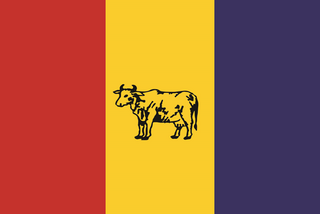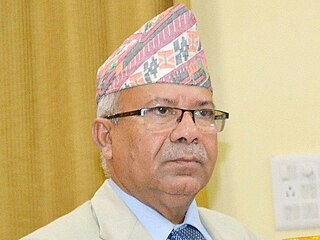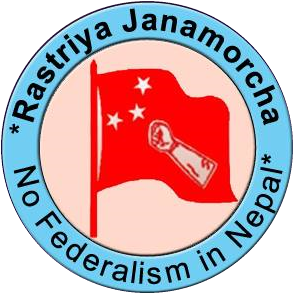
The Nepali Congress is the oldest social democratic political party in Nepal and the largest party in the country. The party has 870,106 members as of the party's 14th general convention in December 2021 making them the largest party by membership in Nepal. In June 2023, the party started online membership since the emergence of youth leaders in vital post to bring youths into the party. The party is led by former prime minister, Sher Bahadur Deuba since the party's thirteenth general convention in 2016. The party won 89 seats in the 2022 general election and is currently the largest parliamentary group in the House of Representatives.

Pushpa Kamal Dahal, alias Prachanda, is a Nepalese politician, currently serving as the Leader of the Opposition, since July 2024. He has served as the Prime Minister of Nepal on three separate occasions, from 2008 to 2009 as the first prime minister of the Federal Democratic Republic of Nepal, from 2016 to 2017, and again from 2022 to 2024.

The Communist Party of Nepal (Unified Marxist–Leninist) (Nepali: नेपाल कम्युनिष्ट पार्टी (एकीकृत मार्क्सवादी-लेनिनवादी), romanized: nēpāl kamyuniṣṭ pārṭī (ēkīkṛt mārksavādī-lēninavādī); abbr. CPN (UML)) is a communist political party in Nepal. The party emerged as one of the major parties in Nepal after the end of the Panchayat era.

The Rastriya Prajatantra Party is a constitutional monarchist and Hindu nationalist political party in Nepal.

Man Mohan Adhikari (Magi) (Nepali: मन मोहन अधिकारी; 9 June 1920 – 26 April 1999) was the 31st Prime Minister of Nepal from 1994 to 1995, representing the Communist Party of Nepal (Unified Marxist-Leninist). He was the first communist Prime Minister in Nepal and one of the first communist politician in the world to be democratically elected as a head of government.

Rashtriya Prajatantra Party-Chand was a Nepalese political party. It was a right-wing pro-monarchy party, formed out of the political elite of the erstwhile Panchayat system.

Madhav Kumar Nepal, is a Nepalese politician and former Prime Minister of Nepal. He served as prime minister from 25 May 2009 to 6 February 2011.
General elections were held in Nepal on 15 November 1994 to elect the Nepal House of Representatives. The election took place after the previous Nepali Congress government collapsed and King Birenda called new elections. The results showed that the Communist Party of Nepal won the most seats in the House of Representatives and Man Mohan Adhikari became Prime Minister at the head of a minority government.
Chandra Prakash Mainali more commonly known as C. P. Mainali is a communist politician in Nepal and former Deputy Prime Minister of Nepal.

Rastriya Janamorcha is a political party in Nepal. It was originally founded in 1995 as the legal front of Communist Party of Nepal (Masal). Former Deputy Prime Minister, Chitra Bahdur KC is the chairman of the party.

Indirect presidential elections were held in Nepal in July 2008. The first round of voting was held on 19 July, with a run-off on 21 July. The Nepalese Constituent Assembly (CA) elected in April 2008 elected a new president and vice-president after the Fifth Amendment to the Interim Constitution was passed on 14 July. This would be the first President to be elected after Nepal became a republic a few months earlier.

Kamal Thapa is a Nepalese politician belonging to Rastriya Prajatantra Party Nepal.

Khadga Prasad Sharma Oli, commonly known as K. P. Sharma Oli, is a Nepalese politician serving as the Prime Minister of Nepal since 15 July 2024.

General elections were held in Nepal in two phases on 26 November and 7 December 2017 to elect the 275 members of the fifth House of Representatives, the lower house of the Federal Parliament of Nepal.
On 25 February 2014, following the 2013 Nepalese Constituent Assembly election, the Nepali Congress Party formed a government out of the 2nd Nepalese Constituent Assembly led by Sushil Koirala and backed by the Communist Party of Nepal. The cabinet consisted of 11 ministers from the Nepali Congress Party, 11 ministers from the Communist Party of Nepal, one minister of the Unified Communist Party of Nepal (Maoist), two ministers of the Rastriya Prajatantra Party and five ministers from other parties.
Rastriya Prajantantra Party (Samyukta) (Nepali: राष्ट्रिय प्रजातन्त्र पार्टी (संयुक्त)), literally the National Democratic Party (United) and abbreviated RPP (U), was a political party in Nepal. It was formed on 6 August 2017 by Pashupati Shamsher Jang Bahadur Rana after splitting from the Rastriya Prajatantra Party as the Rastriya Prajatantra Party (Democratic). On 31 January 2019, it merged with the Unified Rastriya Prajatantra Party (Nationalist), another splinter group of the Rastriya Prajatantra Party, to form Samyukta.

Communism in Nepal traces its roots back to the pro-democracy movement of 1951, and the subsequent overthrow of the autocratic Rana regime and the establishment of democracy in Nepal. The communist movement in Nepal has split into factions multiple times and multiple factions have come together into a single fold at times as well. It has a history of getting banned from open political discourse, as well as multiple instances of embracing guerrilla insurgency, most notably, the Maoist insurgency in the 1990s and early 2000s that led to the Nepalese Civil War, claiming at least 17,000 lives.

General elections were held in Nepal on 20 November 2022 to elect the 275 members of the House of Representatives. There were two ballots in the election; one to elect 165 members from single-member constituencies via FPTP, and the other to elect the remaining 110 members from a single nation-wide constituency via party-list proportional representation.

The Dahal cabinet, 2022 or Third Dahal Cabinet was the former Government of Nepal, formed on 26 December 2022 after Pushpa Kamal Dahal was appointed as the new Prime Minister of Nepal by president Bidya Devi Bhandari, following the 2022 Nepalese general election.















